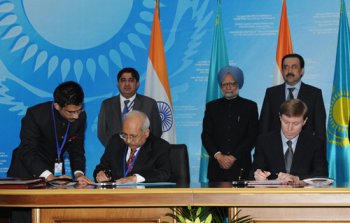The governments of India and Kazakhstan have signed an agreement on cooperation in peaceful uses of nuclear energy. The agreement follows a memorandum of understanding signed by the two countries in 2009.
 |
| Prime Ministers Manmohan Singh and Karim Massimov look on as the agreements are signed. (Image: Prime Minister's Office) |
The agreement was signed in the Kazakh capital Astana during an official visit to Kazakhstan by Indian prime minister Manmohan Singh. In a joint statement on behalf of the two countries, the governments "noted the need for expansion of mutually beneficial cooperation in this area while adhering to their existing obligations under multilateral nuclear regimes." The nuclear cooperation agreement was one of many signed during the visit, covering areas as diverse as food security, energy sector cooperation and space research.
The nuclear agreement comes after a 2009 memorandum of understanding signed during a visit by President Nursultan Nazarbayev to India, which provided for Kazkahstan to supply uranium to India and also expressed Kazakh interest in possible nuclear power projects based on Indian pressurized heavy water reactor (PHWR) designs. Although the joint statement issued by the two countries did not give details on the terms of the cooperation agreement, Singh was later questioned as to whether India was planning to sell nuclear reactors to Kazakhstan. "There has been a discussion on that but no concrete decision has been taken," he told reporters at a press conference.
In the same press conference, Singh was also positive about the need for nuclear power in the light of incidents at Fukushima. Admitting that there is likely to be "a certain amount of nervousness about extensive use of nuclear energy" in the short term, he expressed his belief that "when cool headed discussions take place about the future of energy," nuclear would be "one of the essential options which all countries must keep in order to deal with the problems like climate change and energy security."
India has 20 operating nuclear units with five more, including a fast breeder, under construction. Another 39 are planned or firmly proposed. However, the country has only modest indigenous uranium resources. In October 2010, the Nuclear Power Corporation of India Ltd (NPCIL) reported that it had imported some 868 tonnes of uranium so far that year, including 300 tonnes of natural uranium from Kazakh nuclear company KazAtomProm.
Kazakhstan, on the other hand, has 15% of the world's uranium resources and became the leading uranium producing country in 2009. The country was home to the BN-350 fast reactor at Aktau, which was built under Russian supervision and operated for 27 years, closing in 1999. The Kazakh government has expressed interest in the possibility of using nuclear power, and plans for a Japanese-built 600 MWe boiling water reactor, most likely in eastern Kazakhstan, feature in the state program for nuclear energy development in the period 2010-2020.
Researched and written
by World Nuclear News




_66891.jpg)
_30199.jpg)
_72306.jpg)






